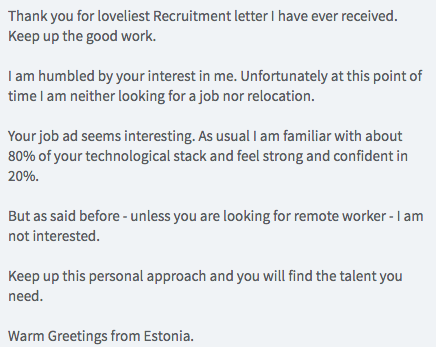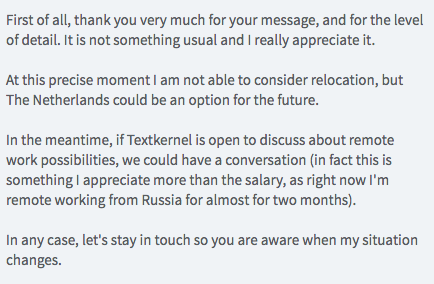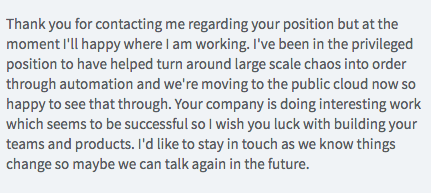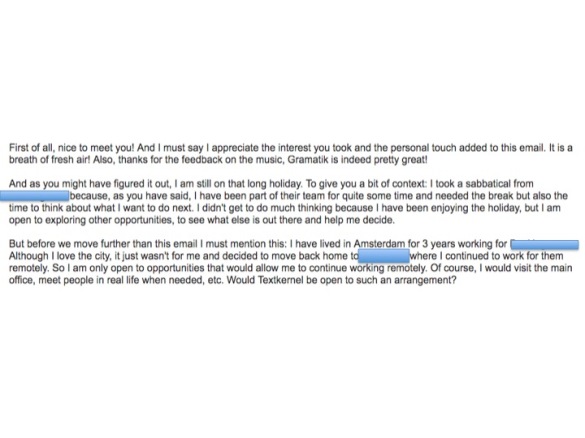I have never written a post about a conference I visited before, but this time there is something I’d like to say. Because I think it’s kind of important and we did not say it out loud yet, however quite a few presentations and break out sessions were touching on this.
Sourcing success is not about finding more people.
I never understood statements such as “1000 candidates generated in a day- booom!!” coming from sourcers. Or in fact from anyone, because it disguises problems and tricks people into thinking that it is in itself a success.

Problems you say?
1. Sloppy engagement. Glen Cathey and many others have been emphasising the importance of engagement in sourcing for quite some time. But what really resonated with me from sosueu was when he talked about building rapport. Just in case you weren’t there, this is what rapport means:

With better engagement, you get better response rate – thus having a smaller candidate pipeline should be enough to provide the amount of qualified AND interested candidates you need for the position. But this is pretty trivial. (I would also go as far as to say considering a conversion rate of approach/conversation with a positive outcome could be an interesting KPI to explore.)
However I see a key in this: even in a case when a candidate says no to you, it should build your relationship with them: it should happen in a way that acknowledges your credibility and provides good ground for future inquiries.



 They see I am not a tool and they all made an opening for me to follow up – when time comes.
They see I am not a tool and they all made an opening for me to follow up – when time comes.
2. Commitment in the line. Karen Azulai was I am fairly sure the first one ever to talk at a conference for bigger audiences about sourcing failure and what a breath of fresh air she was! She covered a whole lot of important points in a very enjoyable presentation – I sure hope to see her again! What I missed though was a bit “harsher talk”, in the sense that I still haven’t heard basic truths that need to be said out loud.
I truly believe that sourcing is grown enough for us to come to any table as equal negotiating partners and communicate what our terms are for successful cooperation. What I mean by this? You should establish a delivery process that not only has responsibilities for you – but also for the managers, HR, everyone involved in hiring on the business side.
So many times do we see failures originating from the business. Just think about it: how many times did you have to go and search for new candidates because their communication with the applicant wasn’t on time, may that be setting up and interview or providing positive feedback? While, in theory, they also know that no market in the world enjoys a luxury of swimming in a sea of qualified candidates. Heck, that is why they need sourcing, isn’t it?!
Or another favourite of mine: not willing to “pay the proper price” for a candidate. Pushing through a candidate who would not just tick required hard skill boxes but be a good cultural fit – only to receive an offer 5 -10 grand below their quoted salary indication. Familiar, right?
Don’t get me wrong, I don’t believe in unicorns (yeah right…) – but there are a few things you should absolutely be clear about before starting an assignment:
- salary levels they offer are at least market rate
- once you submitted a candidate they will give feedback on them within a couple of days, a week is definitely too long
- in case they are positive they will reach out to the candidate the following day
- interview process and dates are known beforehand, if not possible – information about a next step goes out to the candidate within a week of the previous round
- you have “access” to the hiring manager for discussions at a regular interval
- both you and the business agree on “how the ideal candidate looks like”
If you are not able to get all of this sorted or find out that during your cooperation they are not holding up their end, work on these with them. In case you did your best and it’s still not changing, walk away. Why? Because your value as a sourcer are the candidates in your network, especially the good ones that fall out of a process. Being able to call on them for something else is rare, thus if a sloppy hiring process would make you lose them, think about the long term benefits. And run. It’s not like good sourcers would need to struggle for months to find a good job, right? 🙂
Another great post! I tried commenting before but didn’t see it post so I am trying again.
As it was my first time presenting to my social engineering content, I was worried I might not be able to make all of my points clearly enough.
The benefits of establishing solid rapport go well beyond increasing response rates. It can also solidly boost the ability to convert people who aren’t looking into viable candidates as well as significantly increase referrals, which certainly isn’t trivial. 😉
LikeLike
Hi Glen, thanks so much for your comment! I thought your material was really well constructed with a lot of very important and fun pieces of information. And of course, you know, you quoted a “Hungarian” a lot – so plus points all the way. Was looking forward to you having a go at pronouncing his name 🙂
And indeed – your two additions definitely are worth mentioning! I hope people will come down to read the comments for it!
LikeLike